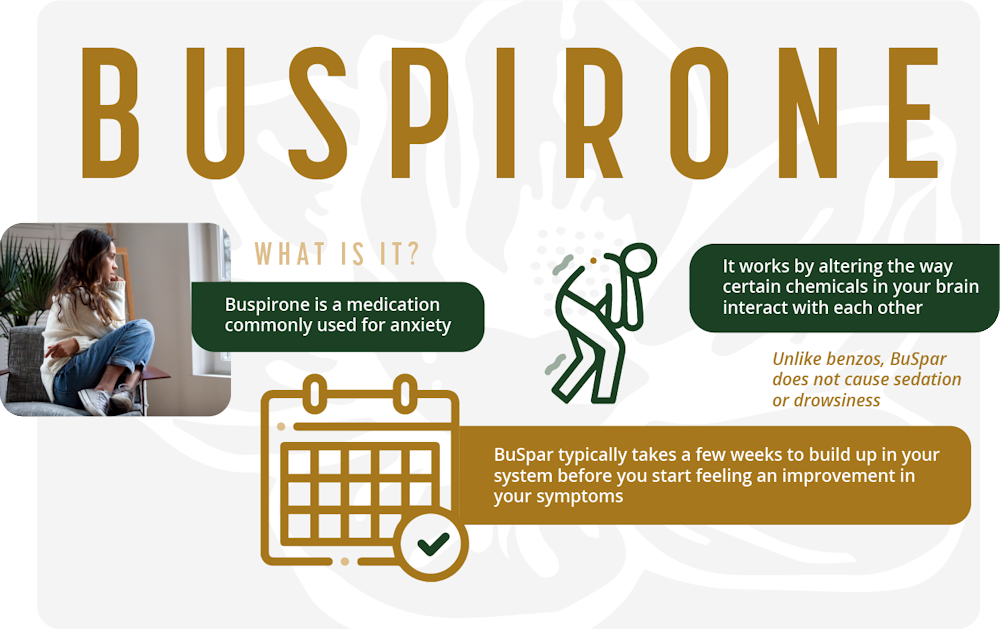If you’re someone suffering from anxiety, you may have been prescribed or heard about BuSpar. It’s a medication used to treat anxiety symptoms, and it’s gained attention recently due to its potentially addictive side effects. If you’re considering taking BuSpar or feel like you’ve become dependent on it, it’s important to understand the risks associated with this medication.
Here we’ll give an overview of what BuSpar is, what it does and the risks it may expose you to. If you or someone you know is affected by this drug you may consider a medical detox program to overcome addiction.
What Is BuSpar and Its Purpose?

BuSpar (buspirone) is an anti-anxiety medication that is used to reduce tension, uneasiness, and agitation in people dealing with anxiety disorders. It belongs to a category of medications known as “azapirones.” BuSpar was initially approved for use by the FDA in 1986 and was commonly prescribed for the treatment of panic disorder and generalized anxiety disorder.
Unlike benzodiazepines, BuSpar does not cause sedation or drowsiness but rather works by altering the way certain chemicals in your brain interact with each other. It’s still generally considered to be a non-addictive medication, yet it can still help people relax long-term without having to take it as often.
BuSpar typically takes a few weeks to build up in your system before you start feeling an improvement in your symptoms. This is why it’s not the best option for instant relief.
While not having the same drowsy effects as benzos, it is still possible for someone to become psychologically dependent and develop a BuSpar addiction. Additionally, abruptly stopping Buspar may result in withdrawal symptoms such as headaches, dizziness, and anxiety. Learning how to manage withdrawal symptoms provides some relief but if you’re experiencing withdrawal it’s important to seek help.
Who Gets a BuSpar Prescription?
Buspirone, also known by its brand name, BuSpar, is a medication commonly prescribed to treat anxiety and related conditions. It’s used to help people manage their mental health issues, regulate mood, and relieve stress and tension.
BuSpar is often prescribed to those who suffer from social anxiety, certain forms of depression, generalized anxiety disorder, and obsessive-compulsive disorder (OCD). It’s also taken as an adjunct treatment when used with other medications for the treatment of anxiety or depression.
How Is Buspirone Taken?
Buspirone, is taken orally, usually in tablet form. It’s usually prescribed in 5mg, 10mg, or 30mg doses and is generally be taken two to three times a day. Depending on the dose prescribed, it may be taken with or without food.
Dosage Increase
It is important to note that the dosage for Buspirone shouldn’t be suddenly increased or decreased, as this creates a higher risk of serious side effects. If someone has been prescribed Buspirone, they should consult their doctor if they need to have the dosage changed.
Missed Dosage
If someone misses a dose of Buspirone, they shouldn’t double up on the next dose; they should simply take their next scheduled dose as directed.
What Are the Risk Factors of BuSpar?
If you’re considering taking BuSpar, you might be wondering if there are any risk factors. The truth is, when taking this medication, you should use it with caution.
Here are some of the possible physical and psychological effects on individuals who are addicted to Buspar.
Increased Risk of Overdose
Buspar can have serious adverse effects and perhaps dangerous health implications if taken in a way that’s not advised by a doctor. Some individuals may misuse Buspar because they think it will create feelings of relaxation or euphoria. Taking high doses of Buspar can lead to an overdose, which can even be fatal.
Cognitive impairment
Despite being generally considered safe and effective for the treatment of anxiety disorders, Buspar can have negative side effects in certain users, including cognitive impairment.
Cognitive impairment referred to issues with the mind’s cognitive functions, including memory, attention, language, and problem-solving. Cognitive impairment is a negative effect that some Buspar users may suffer. This may show up as a lack of focus, forgetfulness, or a “fuzzy” mental state.
Mental Health Issues
Although it may be helpful in easing anxiety symptoms, it is not normally used to treat other mental health illnesses like depression, bipolar disorder, or schizophrenia because doing so can only make these conditions worse.
Relationship and Financial Problems
Buspar, when misused or abused, can lead to a range of negative consequences, including to personal relationships and finances. The individual could develop withdrawal symptoms that can damage relationships with their loved ones. BuSpar addicts become agitated or unpredictable and put their drug use before spending time with their family and friends.
Resentment, conflict, and other related issues may result from this. In addition, they can spend large amounts of money obtaining the drug, which may lead to financial issues.
Difference Between Benzos and Buspirone
Even though both are used to treat anxiety, there are differences between Benzos and Buspirone. For example the way they work is very different.
Benzos can produce a sedative effect, which helps relieve stress and anxiety. On the other hand, BuSpar doesn’t possess these sedative effects; instead, it renews brain chemicals that result in a calming effect. It’s often used for short-term relief of anxiety symptoms. While addiction to prescription drugs can happen with any pill, it’s more common to become addicted to benzodiazepines.
To be clear, Benzos and Buspirone are not interchangeable drugs; they function differently, and each has its own unique side effect profile to consider.
Benzo properties:
Here are characteristics of benzodiazepines:
- Target GABA neurotransmitter receptors in the brain
- Increase the effects of GABA in the brain to create a calming effect
- Develop habits when used long-term or in large doses
- Have a fast onset time – feel effects quickly
Buspirone Properties:
Here are characteristics of Buspirone that make it different from benzos:
- Does not directly affect GABA receptors but increases serotonin levels instead
- Has no sedative or muscle relaxant actions like Benzos have; offers relief without general sedation or ‘drowsiness’
- Has no potential for abuse or addiction; if taken as prescribed it’s considered safe and non-addictive
Effects of BuSpar When Taken With Alcohol
Taking BuSpar and alcohol together is not recommended, as they can enhance each other’s effects on an individual’s cognitive function and increase the risk of injury or overdose. An individual’s capacity to think and make judgments may be seriously compromised when taking BuSpar and alcohol together. They might end up taking risky actions that they ordinarily wouldn’t.
Moreover, mixing BuSpar and alcohol might intensify both drugs’ sedative effects, resulting in extreme sleepiness. This can be especially risky as it increases one’s likelihood of falling asleep behind the wheel or engaging in other dangerous activities while under the influence.
BuSpar and alcohol may also affect the central nervous system, causing side effects such as headaches, vomiting, blurred vision, and dizziness. When used over an extended period of time, this combination may also result in physical dependence on the drug and withdrawal symptoms if use is stopped. In a worst-case scenario, combining the two can result in more serious side effects, such as seizures or respiratory problems.
Those with an alcohol addiction may be more likely to use both at the same time. If you experience any of these symptoms after drinking alcohol while taking BuSpar, contact your doctor immediately for medical intervention.
Signs of BuSpar Abuse
If you or someone you know is abusing BuSpar, there are certain warning signs to look out for:
- Taking more than the prescribed dosage of Buspirone
- Crushing or snorting medication pills
- Taking Buspirone with alcohol or other drugs
- Becoming overly emotional or displaying aggression
- Experiencing withdrawal symptoms such as nausea, dizziness, headaches, etc.
- Developing a tolerance and needing larger doses to achieve the same effects
- Spending too much time trying to obtain additional Buspirone to use recreationally
- Cravings for taking more BuSpar than is necessary.
It may be difficult for someone with a BuSpar addiction to stop on their own. This is when it’s important to seek medical help and detox in an approved treatment facility such as Magnolia City Detox Center. To get someone help you can intervene and introduce them to resources.Such a recovery center can help an individual recover safely from addiction and dependency on medications like BuSpar.
Withdrawal Symptoms from Buspirone
One of the signs that someone may be addicted to Buspirone is if they experience withdrawal symptoms when they discontinue its use. These symptoms can include shock-like sensations, nightmares, tremors, and increased anxiety. Anxiety is a common withdrawal symptom from many drugs, including BuSpar. In addition to anxiety, some people can experience dizziness and nausea upon withdrawal from Buspirone.
Some other potential withdrawal symptoms of Buspirone can include:
- Depression
- Insomnia
- Fatigue
- Irritability
- Muscle pain
- Loss of appetite
- Increased heart rate
- Panic attacks
If you have been taking BuSpar for an extended period of time and attempt to stop taking it suddenly, you may experience more pronounced withdrawal symptoms as your body adjusts to its lack of Buspirone. It’s best to consult with your doctor before stopping any medications and discuss the best route for discontinuation with them.
Treatment for Buspirone Addiction

Buspar addiction is a relatively uncommon problem as it isn’t thought to be highly effective. However, if some have become dependent on it, professional treatment might still be required.
The initial step in the treatment of BuSpar addiction is to undergo medical detoxification. This is the process of reducing the drug dosage under the supervision of a healthcare professional. Detoxification helps minimize withdrawal symptoms.
Following detoxification, people may benefit from treatment and counseling to address the root causes of their addiction and create positive coping mechanisms. This could involve family treatment, group therapy, individual therapy, or other kinds of psychotherapy.
In some cases, medication-assisted treatment (MAT) may be recommended to help manage cravings and reduce the risk of relapse. MAT frequently uses drugs like buprenorphine or methadone in order to lessen cravings and withdrawal symptoms,
Get the Help You Need at Magnolia City Detox

If you or a loved one is dealing with BuSpar addiction, know that you do not have to go it alone. The best intensive treatment program is available at Magnolia City Detox, and it is designed especially for people struggling with BuSpar addiction. Our team of qualified medical personnel will provide a thorough course of therapy that is carefully matched to your needs. This plan may include:
- Medically-supervised detoxification
- Education on relapse prevention and healthy coping skills
- Stabilization Program
- Residential Treatment
At Magnolia City Detox, we are committed to providing the best possible care to ensure you or your loved one can recover safely and effectively. Contact us today and learn more about these treatments!

















